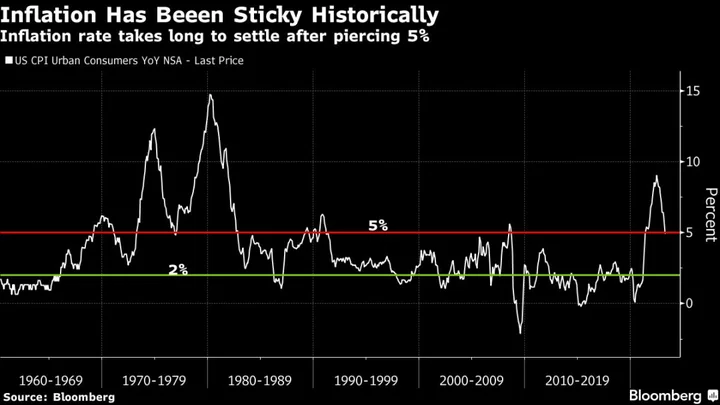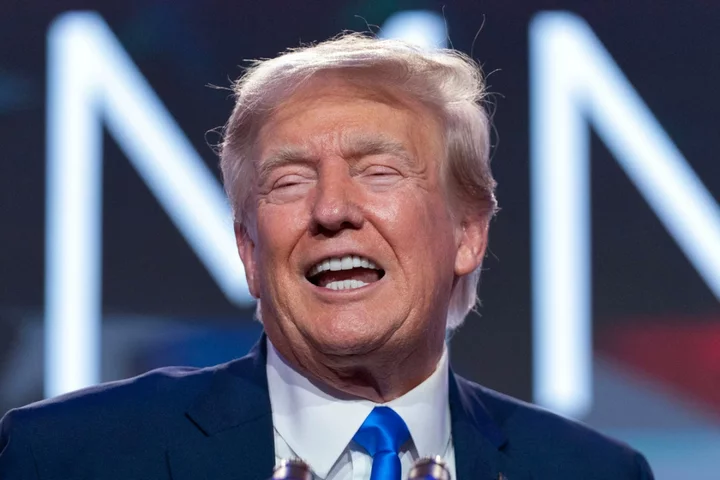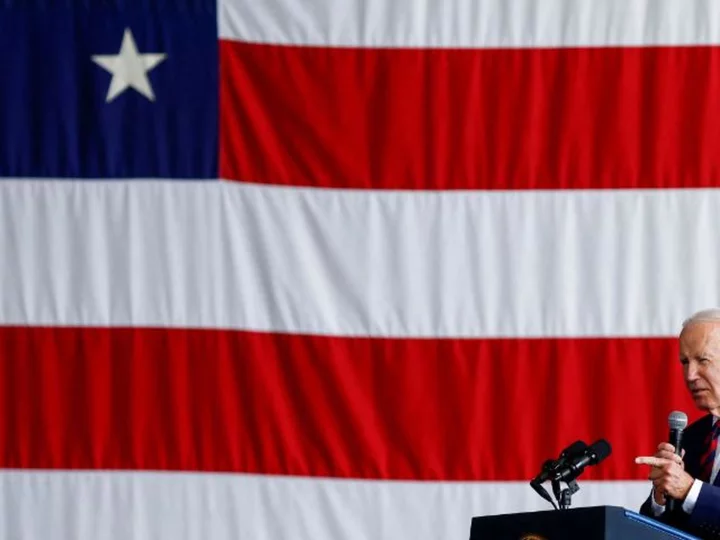Some bond-market bets are signaling that the inflation rate will fall close to the Federal Reserve’s 2% target in the next year. A growing number of Wall Street asset managers are saying that’s a pipe dream.
Fund provider VanEck sees inflation remaining stuck between 3% to 5% for many years, even if the US falls into a recession. Invesco says the market is overly optimistic that an economic downturn will put a lid on price pressures. Citigroup Inc. says it’s almost impossible for inflation to slow down while wage gains stay high.
Asset managers are keen to avoid a repeat of 2022, when the top minds of Wall Street were blindsided both by inflation’s sharp spike and how much the Fed would have to raise rates in response. More are now joining the likes of BlackRock Inc., Bank of America Corp. and DoubleLine Group LP to warn that inflation will remain higher for longer.
“It’s going to come in peaks and troughs,” said David Schassler, head of quantitative investment solutions at VanEck, adding that a recession later this year could drive inflation down temporarily.
“What happens once the economy recovers? We think inflation will rebound as it has in the past,” Schassler said. Higher energy prices will push inflation back up, he added.
Since 1960, it has taken 12 years on average for inflation to slow to 2% or lower once the US consumer price index has breached 5%, according to data compiled by VanEck. While the Fed’s target focuses on the price index for personal consumption expenditures, both figures are watched closely by the central bank and investors. Inflation based on the Bureau of Labor Statistics’ CPI has historically run about 0.3 percentage points faster than the Commerce Department’s PCE, with an even bigger gap during the pandemic.
Schassler’s range for inflation refers to both measures.
Getting inflation down to 3% by mid-2024 will be feasible if a recession starts in the second half of this year, said Anna Wong, chief US economist for Bloomberg Economics, citing both CPI and PCE. But even staying at that level, much less getting to 2%, won’t be easy, because there’s a limit to how much prices for goods, services and housing can continue to drop, she said.
To prepare for years of sticky inflation, VanEck’s Schassler suggests ditching the traditional 60/40 portfolio. He instead favors allocating 50% to stocks, 35% to bonds and 15% to real assets, with a focus on gold and other commodities.
Invesco’s Jason Bloom also expects inflation — referring to both measures — to remain higher because of massive spending on infrastructure in the US. Energy will likely get more expensive as the US adopts alternatives to fossil fuel, said the firm’s head of fixed income and alternatives ETF product strategy.
Short-duration Treasuries that currently offer higher yields will serve investors well as inflation lingers, Bloom said.
Stuart Kaiser, Citi’s head of US equity trading strategy, says investors will stay defensive for longer through a mix of large-cap technology, industrials and health-care stocks, as well as a hefty allocation to cash, as inflation persists.
“We haven’t seen a ton of evidence that inflation is going to get where the Fed wants it to get, which obviously means they would need to change their forecast and potentially hike further,” Kaiser said, pointing to the increase in average hourly earnings in April that he thinks the market hasn’t priced in.
Equity markets will be able to thrive even if inflation stays elevated, as long as it doesn’t take a sharper turn higher, he said. The firm’s economists expect core PCE to settle at a level higher than the Fed’s forecast, he added.
Still, there are some investors who think that inflation could eventually slow to the Fed’s target. Liz Young, head of investment strategy at SoFi, says a recession could push inflation down to 2% or below, at least for some time. But the path to getting there could be brutal, she said.
“There’s a higher probability that something else breaks than there is that inflation just comes down and we survive it unscathed,” Young said.









